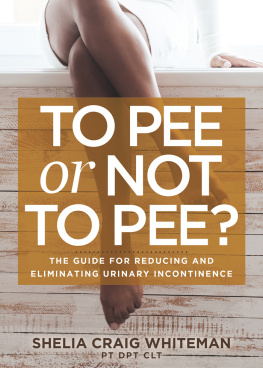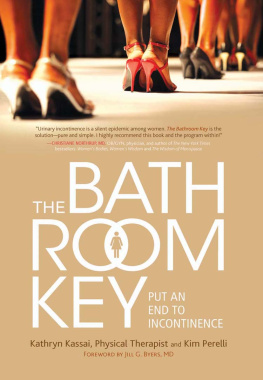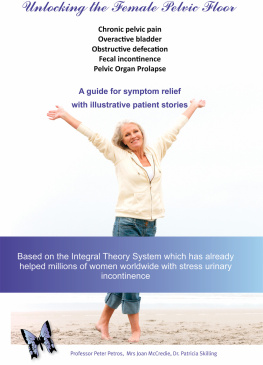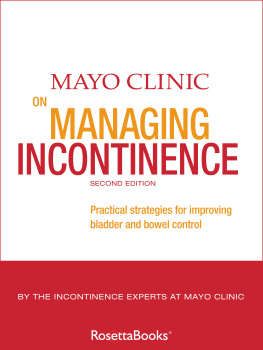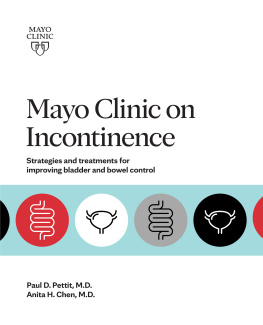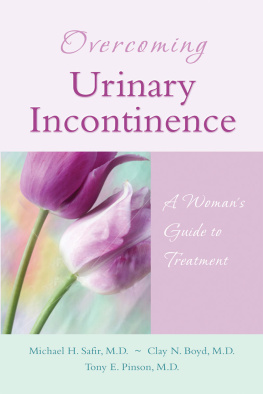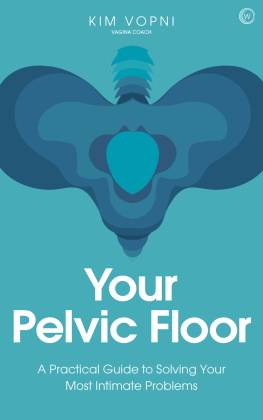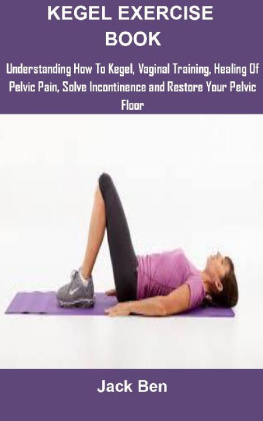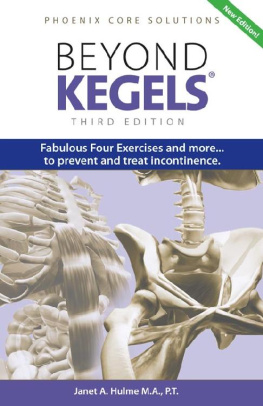TO PEE or NOT TO PEE?
Advance Praise
Shelia has created a simplistic yet empowering guide to bladder control. With over thirty years of experience as a physical therapist, certified Pilates instructor and fitness coach, she brings an integrated approach that every woman could benefit from for pelvic health and wellness.
Sonya Worthy Okolo , Pelvic PT
Shelia is an extremely knowledgeable physical therapist and demonstrates excellent skill as it relates to the areas of pelvic floor and lymphedema management. Shelia has over thirty years of experience as a physical therapist and has spent ten years specializing in the treatment of pelvic floor conditions. Ive had the pleasure of working alongside and under the mentorship of Shelia. This proved to be an amazing experience as I was able to observe Shelia in action as she utilized a variety of techniques to help her patients improve their symptoms and reach their goals. During this time, I was able to glean from her expertise in the field which has proven to be of great benefit to the patient population that I serve. I am truly thankful for experiencing mentorship from one of the greatest in the field.
Tieya M. Qualls , PT, DPT, PRPC
To Pee or Not to Pee has extremely informative content regarding the female pelvic floor and pelvic health! I appreciated the diagrams, practical, factual and simplified details in this book, especially the kegel exercises. Ive also had the pleasure of meeting Dr. Whiteman in person, and I want to emphasize that she genuinely cares for womens health, offering valuable insight that you can apply in your life immediately. I highly recommend Dr. Whitemans book and program to other women who are experiencing leakage and to women like myself, who are focused on pelvic health in general. Theres no need to wait until you have a problem, one can use this book for preventative health too!
Josephine Grace , Teacher, Author, Speaker
TO PEE
or NOT
TO PEE?
THE GUIDE FOR REDUCING AND
ELIMINATING URINARY INCONTINENCE
SHELIA CRAIG WHITEMAN
PT DPT CLT

NEW YORK
LONDONNASHVILLEMELBOURNEVANCOUVER
TO PEE or NOT TO PEE?
THE GUIDE FOR REDUCING AND ELIMINATING URINARY INCONTINENCE
2021 SHELIA CRAIG WHITEMAN PT DPT CLT
All rights reserved. No portion of this book may be reproduced, stored in a retrieval system, or transmitted in any form or by any meanselectronic, mechanical, photocopy, recording, scanning, or otherexcept for brief quotations in critical reviews or articles, without the prior written permission of the publisher.
Published in New York, New York, by Morgan James Publishing in partnership with Difference Press. Morgan James is a trademark of Morgan James, LLC. www.MorganJamesPublishing.com. Morgan James is a trademark of Morgan James, LLC. www.MorganJamesPublishing.com
ISBN 978-1-63195-074-2 paperback
ISBN 978-1-63195-075-9 eBook
ISBN 978-1-63195-076-6 audio
Library of Congress Control Number: 2020903731
Cover Design Concept:
Nakita Duncan
Cover Design:
Rachel Lopez
www.r2cdesign.com
Editor:
Nkechi Obi
Book Coaching:
The Author Incubator

Morgan James is a proud partner of Habitat for Humanity Peninsula and Greater Williamsburg. Partners in building since 2006.
Get involved today! Visit
www.MorganJamesBuilds.com
To my wonderful husband and children who have given me the courage to keep learning, doing, and trying. I hope to make them as proud of me as I am of them. A special thank you to my fabulous daughter, Morgen A. Whiteman for the sketches contained in this book and her constant encouragement.
CHAPTER 1
DID I JUST PEE ON MYSELF?

Who? Me?
Have you ever had the pleasure of experiencing bladder leakage? I can remember the first time I waited way too long to get to a bathroom. When I started to pull down my pants, I felt a few drops of urine escape. My first thought was: Did I just pee on myself? Thankfully it did not become a regular occurrence, but it scared me enough to work to make sure it wouldnt.
Bladder leaks can affect anyone at any time. Although it is generally not a hot topic for discussion, many of us can relate to that feeling of a few drops of urine leaking out at some point in our lives. As a pelvic health physical therapist, I can say if you have experienced a leak or two, you are not alone. As a matter of fact, I would venture to say you have quite a bit of company. In the many years that I have focused on pelvic issues, incontinence, or bladder leaks, are one of the more common reasons people come to therapy for help. I frequently hear that if it wasnt for their physicians referral, the patient would not know that there is help available to stop leakage. Pelvic health physical therapy is becoming more common, making it much easier to find help to successfully stop or reduce bladder leakage.
Why Does It Take So Long to Get Help?
Several women I have worked with have a history of leakage going back years before I or any other therapist has seen them. Some of this may be due to just being so busy day after day. A small amount of leakage is very easy to ignore, especially if it is small enough to not change your daily activity. Many women are also in denial about what is going on. I have had women who wear a pantiliner every day think that they do not have leakage since a few small drops doesnt stop them from doing anything they want to do. I have heard that physicians are asking about bladder leaks during patient visits. Even my gynecologist has a questionnaire that asks if you are concerned or experienced leakage. This is progress! I hope this question becomes routine for all doctors to increase self-awareness. When leakage is treated early it is easier to stop.
You Are Not Alone
Amy is a fifty-year-old who complained of some bladder leakage whenever she had a cold. She told me the problem had been happening on and off for maybe five years or so. She has leaks when she coughs or sneezes. She is really only bothered at certain times of the year; she works with children and there is always one with a cold, runny nose, or cough. She thinks her leakage has been getting progressively worse, but this past year the leakage was really bad.
During our discussion, I asked her why she did not come for treatment when she first started leaking a few years ago. Her response: I didnt look at it as a problem. Everyone has leakage at some point, right? Once I started using pantiliners, I really didnt consider it to be a problem. I am only here now because I am starting to leak through the pad. I dont want to have an accident.
If Amy acted at the beginning of her bladder problems, she could have started working on solving her problem early and may not have progressed to leaking an amount that was large enough to wet through her clothes. Better yet, she may have solved her problem sooner and with less effort. Isnt it interesting that we feel as long as something does not change our regular schedule or cause any issue, we can just deal with it and hope it goes away? Amy ignored seeking help for years because she could wear a pad and not change her daily routine. How many of you are doing the same thing? If this scenario feels familiar, I hope this book will help you to recognize and act to solve your problem.

